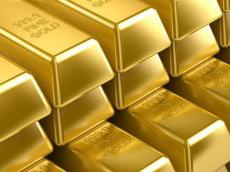|
|
TODAY.AZ / World news
Iran actively stocks up with gold
19 May 2012 [10:17] - TODAY.AZ
 Iran, in order to preserve capital in anticipation of tougher sanctions, rapidly increases its reserves in gold. Iran's gold reserves were significantly replenished by selling its oil in exchange for gold bullion, and by a significant increase in the volume of imports of gold.
Iran, in order to preserve capital in anticipation of tougher sanctions, rapidly increases its reserves in gold. Iran's gold reserves were significantly replenished by selling its oil in exchange for gold bullion, and by a significant increase in the volume of imports of gold.Exports of gold only from Turkey to Iran in March 2012 increased by 36 times, compared to the same month in 2011. According to the Institute of Statistics of Turkey, the total volume of gold exports in the period from January to March 2012 amounted to $1 billion against $411 million during the same period in 2011.
The main importers of gold to Iran, in addition to Turkey, are also Russia and the United Arab Emirates.
In addition, Iran has a lot of its gold deposits, number of which is growing. The deposits with reserves of 16 tons of pure gold were found in April in the province of Kurdistan, which has increased the total stock of gold in the deposits of Iran up to 320 tons. Total reserves of the country in the reserve fund amount to 907 tons valued at over $17.5 billion, Iranian media reported.
Traditionally, gold is used by countries to reserve funds amid political instability and economic crisis, because the exchange rates at this time can vary greatly, and thus lead to large losses as opposed to quotes gold. The gold during the financial crisis has demonstrated not only stability but also growth, which any other asset failed to show.
In particular, Iran, increasing gold reserves, intends this way to ensure its food security, using the gold in the calculations for the imported food. Today Iran has a shortage of grain and rice, and to meet the demand for these products, the IRI is currently paying for their imports from Pakistan, India and China with oil.
Western sanctions against Iran's banking system, its exclusion from the SWIFT payment system, as well as difficulties in the in mutual settlements in national currencies with trading partners pose a threat to Iran's ability to provide itself with essential commodities.
It is known that Iran is waiting for a new phase of EU sanctions, which will come into force from July 2012.
Leyla Abdullayeva/Trend/
URL: http://www.today.az/news/regions/107339.html
 Print version
Print version
Views: 4873
Connect with us. Get latest news and updates.
See Also
- 26 December 2024 [08:30]
Sweden introduces new laws starting in 2025 - 26 December 2024 [08:00]
Next year, more than 1 million cars in Egypt will be powered by CNG - 25 December 2024 [23:30]
Number of 5G mobile users in China exceeds one billion - 25 December 2024 [21:27]
Japan allocates $2.1 billion to semiconductor manufacturers in 2025 - 25 December 2024 [19:45]
Taiwan detects the approach of three aircraft and six Chinese ships - 25 December 2024 [15:29]
Russia dispatches medical team to Aktau as Putin extends condolences during CIS Summit - 25 December 2024 [09:00]
Samsung Corporation reduces production of folding smartphones - 25 December 2024 [08:00]
South Korea and United States resume diplomatic activities - 24 December 2024 [23:48]
Philippines justifies deployment of American missile system on its territory - 24 December 2024 [23:17]
India sends astronaut to moon in 2040
Most Popular
 New Zealand rejects plan to introduce its own passports for residents of Cook Islands
New Zealand rejects plan to introduce its own passports for residents of Cook Islands
 Multiple-firing weapons: how India fooled Armenia
Multiple-firing weapons: how India fooled Armenia
 Chairman of Israel-Azerbaijan Joint Economic Committee congratulates Azerbaijani President
Chairman of Israel-Azerbaijan Joint Economic Committee congratulates Azerbaijani President
 Armenian profligates and their Iranian friends gathered in an Azerbaijani mosque again
Armenian profligates and their Iranian friends gathered in an Azerbaijani mosque again
 Fountain Square transforms into winter fairy tale
Fountain Square transforms into winter fairy tale
 Azerbaijan condemns US administration of undermining bilateral relations
Azerbaijan condemns US administration of undermining bilateral relations
 US-Türkiye clash over Syria’s Kurdish dilemma deepens rift between allies
US-Türkiye clash over Syria’s Kurdish dilemma deepens rift between allies
